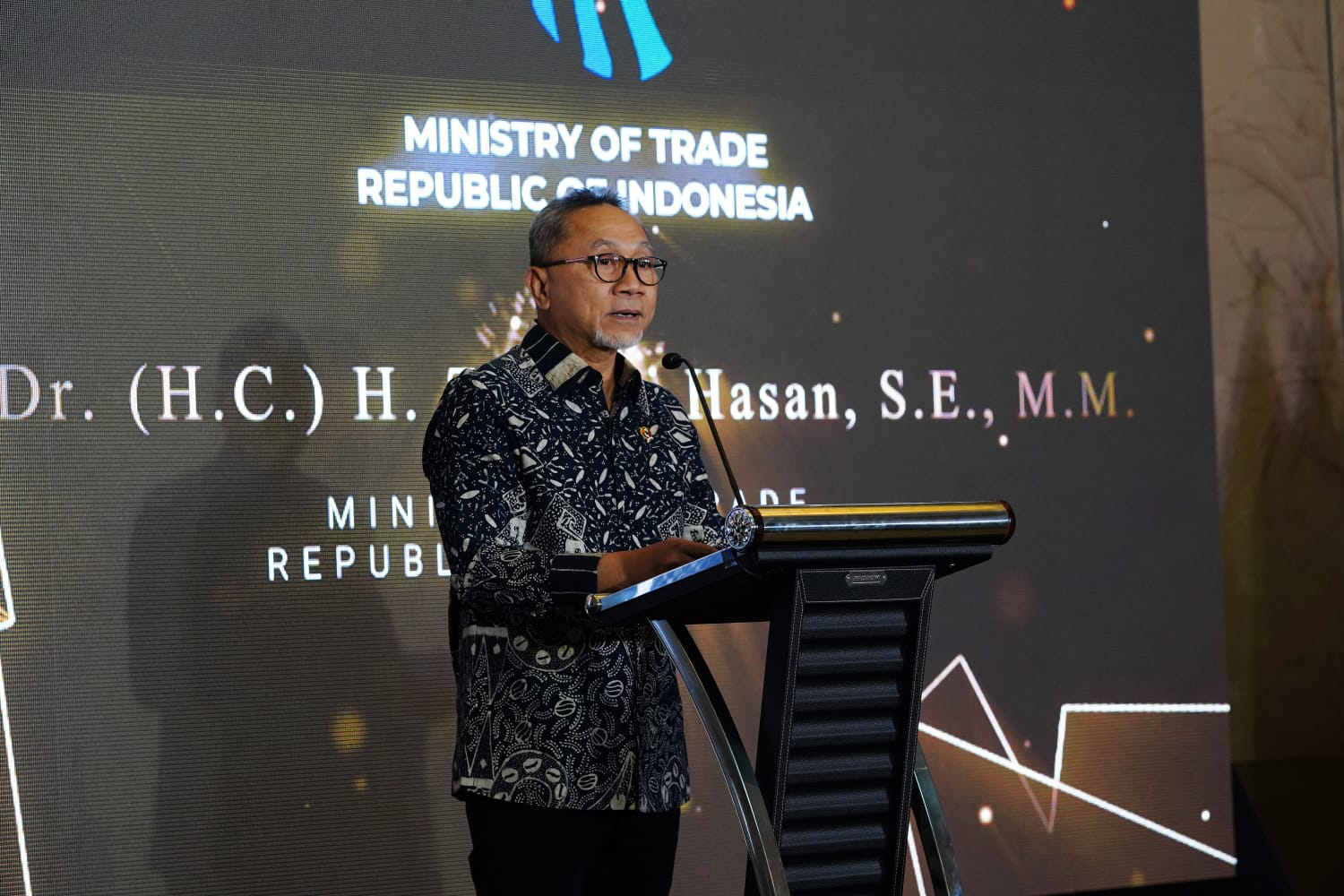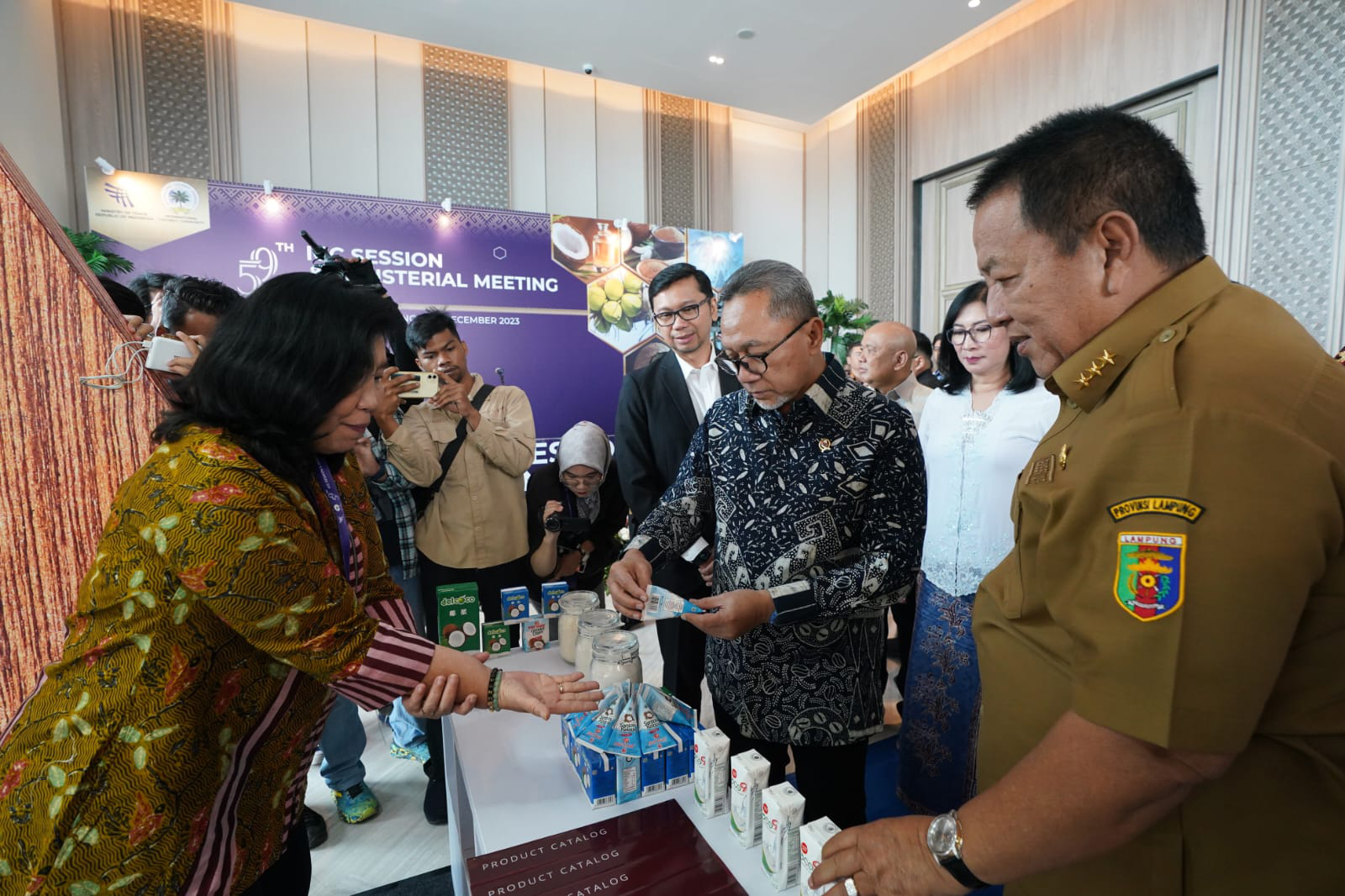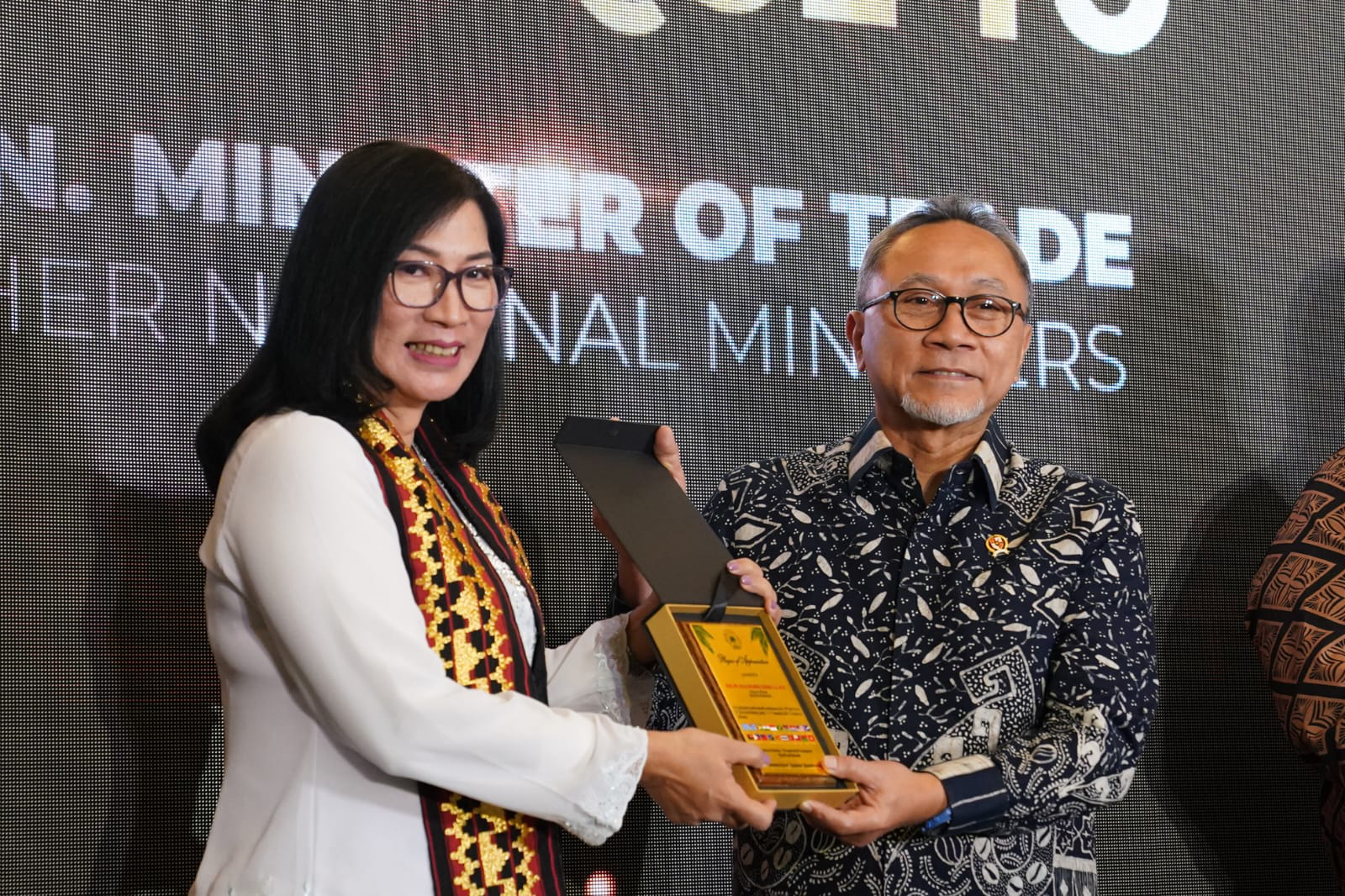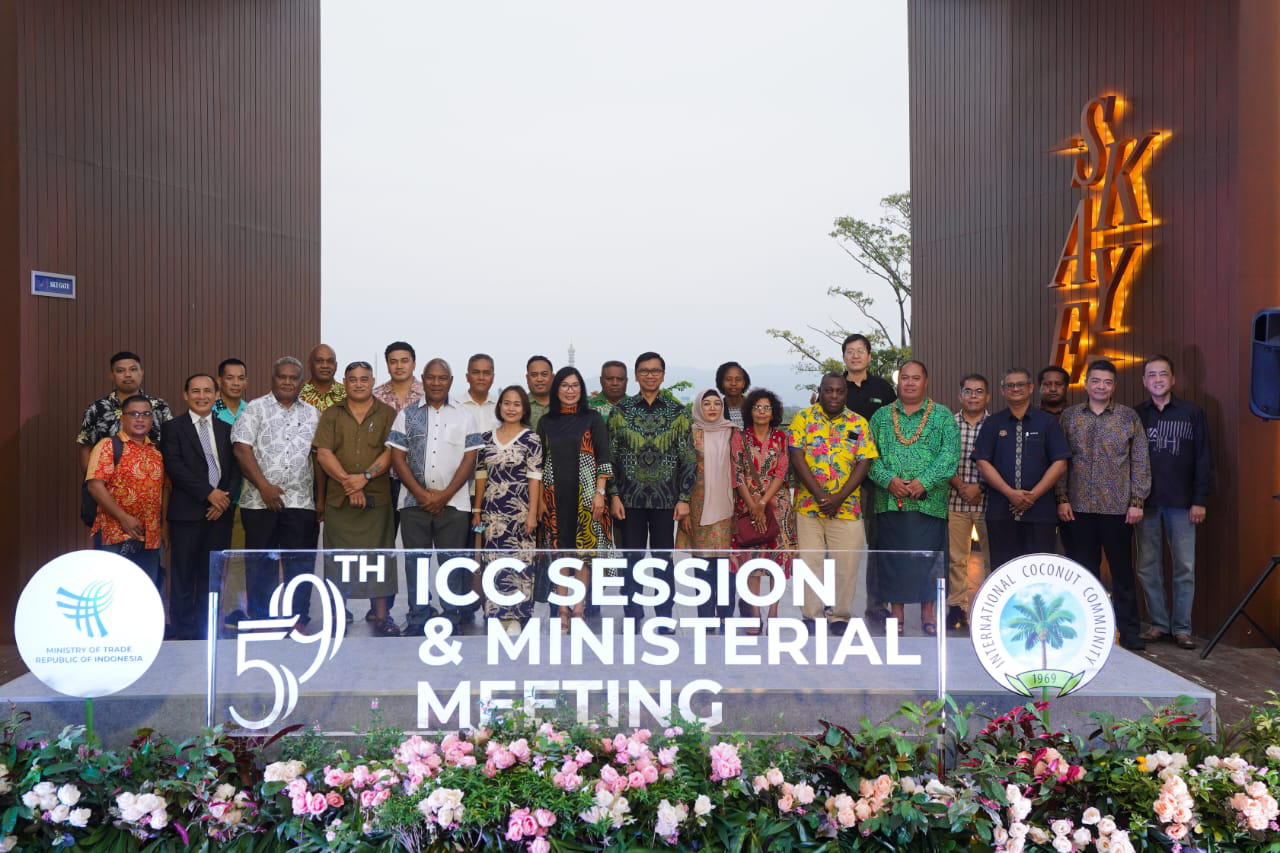ICC Session & Ministerial Meeting is the highest decision-making body of the Community and is held annually to discuss, deliberate and take policy decisions on the activities to be undertaken by the Community for the sustained development of the global coconut sector. The countries are represented at the Session by the Honourable Ministers of Agriculture/Trade/Commerce, Plenipotentiary Delegates authorized by the National Governments and Senior Officials from the concerned Ministries. The three-day-long 59th ICC Session and Ministerial Meeting started at Hotel Santika Premier Lampung, Indonesia, 5-7 December 2023. The Government of Indonesia held the Chair of the International Coconut Community (ICC) for the Current Year 2022-2023 and the Government of Republic of Indonesia through Ministry of Trade is the host for the 59th ICC Session & Ministerial Meeting.

Dr. Jelfina C. Alouw delivered the Introductory Remarks. She addressed that the development of the coconut sector must embed principles of sustainability into every facet of the journey–from cultivation to production and distribution and trade. The coconut's versatility extends from food to non-food sectors, where products like cosmetics, activated carbon, shell-based charcoal and cocopith cocofiber, coco board, building materials products hold promise. The diversification not only caters to market trends but also positions coconut as a key player in preventing deforestation and contributing to soil erosion prevention. The Session served as a significant platform where member countries converge to exchange insights on progress, challenges, and share their national programs, wherein member countries collaboratively address challenges associated with the climate change, insufficient supply of raw materials, price dynamics, and farmer livelihoods, sustainable industry practices, policy and financial supports as well as unjustifiable negative campaign against coconut oil.

In her remarks Dr. Jelfina requested the participants to engage in fruitful deliberations, share experiences, and work towards a sustainable and prosperous future for the global community, farmers, and industry. Constructive dialogues, meaningful deliberation and collaboration will significantly impact the coconut sector and drive transformative actions toward the better implementation of the ICC’s vision and mission.
The remarks was followed with a testimony of Mr. Burhannuddin Rafik, coconut farmer from Indragiri Hilir Regency, Lampung, participant of the Coconut Development Officers Training, conducted by ICC in collaboration with CRI Sri Lanka in August 2023.
Hon. Arinal Djunaidi, Governor of Lampung Province, delivered the welcome remarks. He hoped that through the 59th Session and Ministerial Meeting, member countries can work together to strengthen the coconut industry through diversification and down streaming of coconut products that are needed by the global market. He continued that the result of a conducive environment for increasing the productivity of coconut plants, increasing the competitiveness of processed products from the coconut industry, strengthening markets, and other programs that can ultimately improve the welfare of farmers, the business world, and entire Society.
H.E. Maiava Fuimaono Tito Asafo, Associate Minister of Samoa, delivered the special address as a representative Minister of ICC member countries. He mentioned that the main objective of ICC is to promote, coordinate and harmonize the activities of the global coconut community and industry for the sustainable benefits of their lives of millions of small farmers as well as those engage in production, processing and marketing of coconut products. Therefore, we must continue to support and strengthen the collaboration of all coconut stakeholders from countries through the ICC Secretariat. Amidst the challenges we are facing, it is our responsibility to ensure the established environment for food security and quality nutrition for our peoples. He encouraged all ICC member countries to be strong united to counter issues that discredit coconut resources and industries. He acknowledged with much appreciation to ICC member countries for the collective efforts to continue to provide technical assistance and financial support for the sustainability of the coconut sector and industry.
 H.E. Dr. Zulkifli Hasan, Minister of Trade, Government of Republic of Indonesia officially open the meeting. In his remarks, His Excellency mentioned that coconut has a prominent role in our economy, social, culture and environment. However, we are still facing challenges in coconut sector. Therefore, we need to achieve a sustainable coconut sector that involves improvement from upstream to downstream level as well as encouraging replanting and increasing productivity. More importantly, farmers need to adapt to global climate change. He also encouraged ICC to provide innovative policy recommendations that are applicable to member countries. ICC member countries should strengthen cooperation to support research and development, technology transfer, and program for a sustainable coconut sector. He wished for a constructive action and strengthening the network between coconut producing countries.
H.E. Dr. Zulkifli Hasan, Minister of Trade, Government of Republic of Indonesia officially open the meeting. In his remarks, His Excellency mentioned that coconut has a prominent role in our economy, social, culture and environment. However, we are still facing challenges in coconut sector. Therefore, we need to achieve a sustainable coconut sector that involves improvement from upstream to downstream level as well as encouraging replanting and increasing productivity. More importantly, farmers need to adapt to global climate change. He also encouraged ICC to provide innovative policy recommendations that are applicable to member countries. ICC member countries should strengthen cooperation to support research and development, technology transfer, and program for a sustainable coconut sector. He wished for a constructive action and strengthening the network between coconut producing countries.
After the Opening Ceremony, one of the most important agendas of the Session meeting is the country statement/paper presentation by member countries to give a brief update on the policies and programs for coconut development undertaken by National Governments including the legislation to promote the development of the sector.
The country represented were the Federated State of Micronesia, Fiji, India, Indonesia, Jamaica, Kenya, Malaysia, Papua New Guinea, Samoa, Solomon Islands, Sri Lanka, Thailand, Tonga, and Vietnam. Countries like Guyana, Marshall Islands, Philippines, Timor Leste and Vanuatu were not in attendance. The Country Statement included a brief update on coconut production and productivity, policies and programs for coconut development undertaken by the National Governments to promote the development and sustainability of the sector, the coconut replanting, new planting and rehabilitation programs implemented, processing, coconut industry development programs, marketing and export in their countries; the policies and programs implemented in the country to enhance productivity and increase production and the farmer’s income; the constraints and challenges, impacts of the Covid-19 outbreak, research and development updates, the way forward for the coconut sector.
The other agenda covered were the statement by Mr. Benjamin R. Madrigal Chairman, ICC Technical Working Group(TWG). He presented activities undertaken by TWG to attain ICC’s vision & mission, review of the 5-year ICC strategic plan and suggestions for the strategies for CY 2025-2029, committee recommendations on specific issues, recent activities, and integration of all efforts for the coconut industry development.
Dr. Fabian Dayrit, Emeritus Professor, Ateneo de Manila University, Chairman, Scientific Advisory Committee for Health (SACH), ICC, presented on the proposed ICC Statement regarding the WHO trans-fat replace program.
Ms. Erlene C. Manohar, COGENT Coordinator presented the COGENT’s 4P Advocacy (Protection, Preservation, Propagation, Production); GOGENT Functions, Challenges, Initiated Strategies, Significant Accomplishment, Opportunities and Perspectives, Conference & Workshop Outputs, I-Converged Recommendations, Proposed Mechanism of Transformation through TOC.

The International partner organizations attended and present the nature and extent of their involvement in the coconut sector with reference to collaboration with the community are NAM CSSTC, DOST-PCAARRD, and CABI. The representatives of the organizations presented statements on their activities, potential programs and projects for the development of the coconut sector to be implemented in the member countries with the collaboration of ICC.
The first day of the session was very informative and productive.

